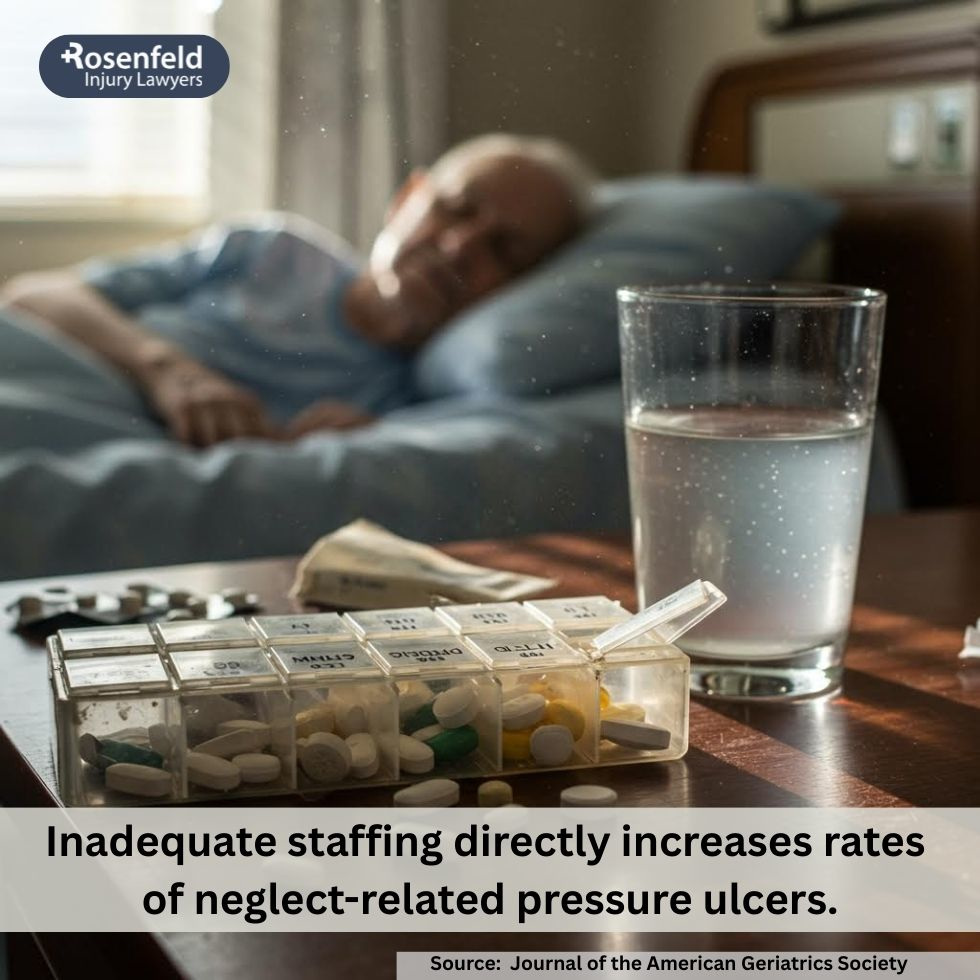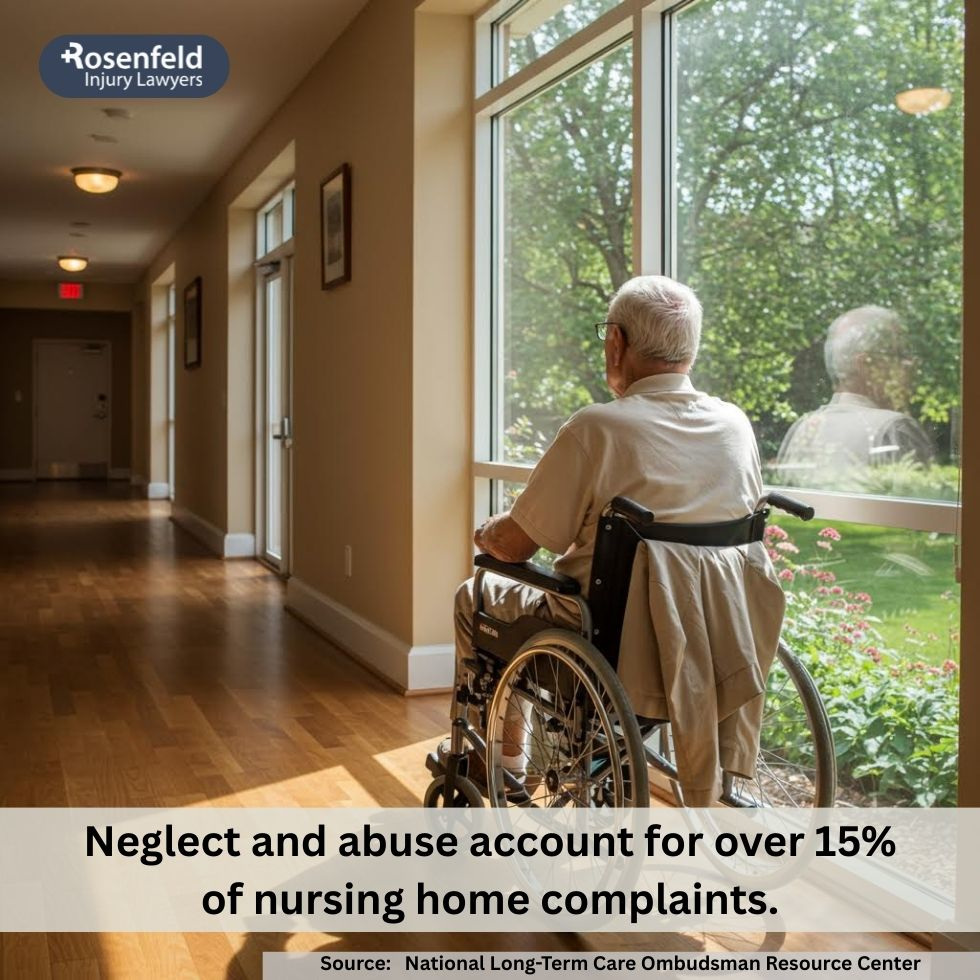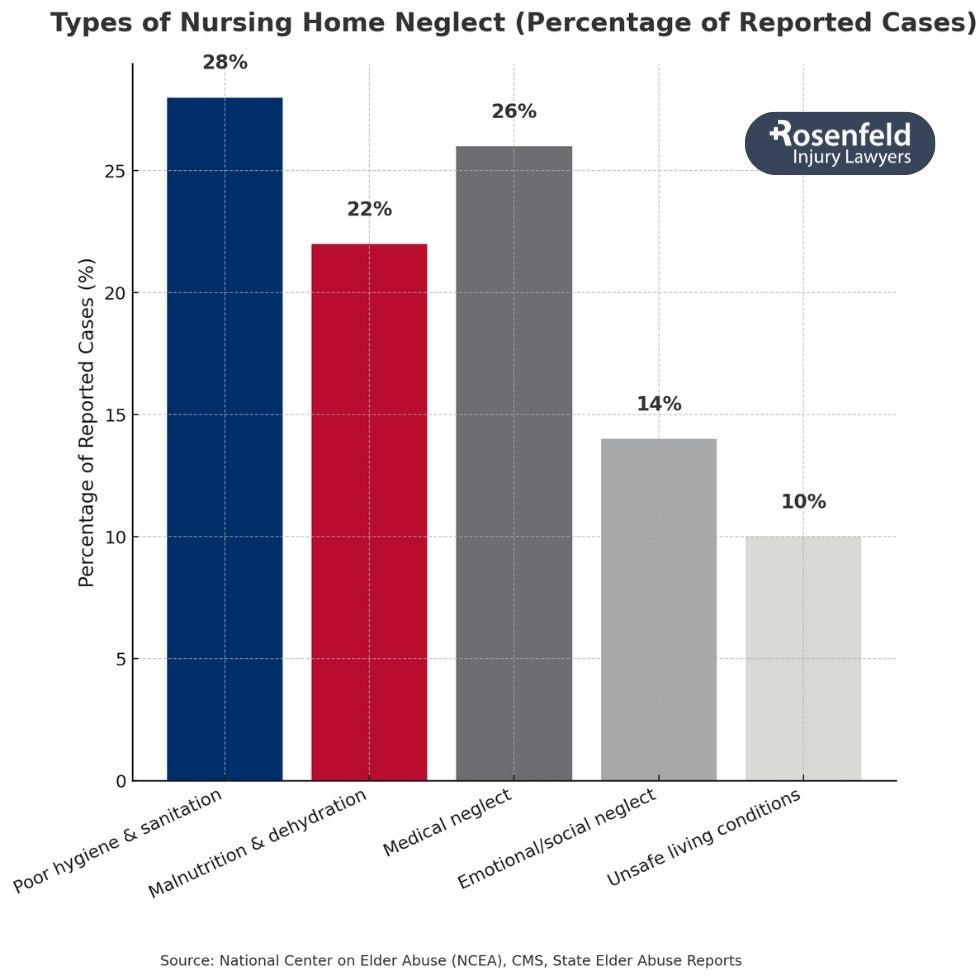- 24/7 Free Consultation: (888) 424-5757 Tap Here To Call Us
Average Nursing Home Neglect Settlement

Average nursing home neglect settlement values are an important concern for families after a loved one suffers harm or dies due to abuse or neglect in a long-term care facility. The emotional toll is devastating, and families are often left facing significant expenses, but there may also be legal options.
At Rosenfeld Injury Lawyers, we help families pursue claims for nursing home negligence. Our experienced nursing home abuse lawyers in Chicago can assess your situation, explain your rights, and guide you through the process of seeking compensation.
What is the Average Nursing Home Settlement in Illinois?
You might come across headlines citing an average settlement of around $406,000 for nursing home claims. That figure offers a general benchmark, but it doesn’t reflect the whole picture.
In reality, the value of an average nursing home neglect settlement depends on several factors, including the severity of the injury, the strength of the evidence, and whether the facility was a nursing home or an assisted living facility.
In Illinois, we’ve seen settlement agreement values vary widely:
- Cases involving short-term harm may result in settlements of between $50,000 and $250,000.
- Moderate injuries with lasting effects can range from $250,000 to $750,000.
- Life-altering injuries or death often lead families to seek compensation between $750,000 and $1.5 million or more.

Examples of Nursing Home Lawsuit Settlements We’ve Recovered
While every case is unique, past nursing home lawsuit settlements can provide insight into what victims of elder abuse and nursing home wrongful death may recover:
- $2.15 million for a family whose loved one died from sepsis caused by untreated bedsores, well above average nursing home negligence settlements.
- $1.5 million for the wrongful death of a dementia patient who ingested chemicals left unsecured by staff; our nursing home abuse attorney proved clear negligence.
- $735,000 after a fall from an unattended wheelchair left a nursing home resident with spinal fractures and a broken leg.
Each of these reflects the impact skilled legal action can have when families seek compensation after neglect.
Settlement vs. Trial in Nursing Home Abuse Cases
In most nursing home neglect cases, families reach a resolution through the negotiation process rather than going to trial. A settlement offers an agreed-upon amount of compensation, typically paid by the facility or its insurance provider. These agreements are often reached after sharing key evidence but before a judge or jury issues any verdict.
Settlement vs. Verdict
A nursing home abuse settlement is a private agreement that can be completed quickly and kept confidential. In contrast, a verdict is the result of a full trial and becomes part of the public record. Verdicts can be unpredictable and emotionally draining, especially when a nursing home resident has already endured trauma from poor care.
Benefits of a Settlement
Settlements are especially common when there’s clear evidence that a nursing home failed to meet basic care standards. They offer:
- Faster resolution: Many settlements are completed within a year, while trials can take two to three years or longer.
- Lower legal costs: Trials involve court fees, expert testimony, and additional filings, which increase overall expenses.
- More privacy: Unlike court verdicts, settlement terms can remain confidential.
- Less emotional strain: Avoiding a lengthy trial can make recovery easier for families grieving or caring for vulnerable loved ones.
When a Trial May Still Be Necessary
If the facility refuses to accept responsibility or minimizes the harm done, taking the case to court may be the only option. In these situations, your personal injury lawyer will prepare for trial to hold the facility accountable and pursue full financial recovery.
Key Factors That Affect Nursing Home Abuse Settlement Amounts
There’s no standard formula for determining nursing home abuse settlement values. Every nursing home abuse case is different, and settlement amounts depend on several important factors, many of which are unique to the nursing facility, the harm involved, and the strength of your legal team’s evidence.
Severity of Harm and Type of Injury
The most serious abuse and neglect cases often lead to the highest nursing home settlements. This includes:
- Brain damage caused by untreated falls;
- Infected bedsores that resulted in sepsis or amputation;
- Wrongful death from dehydration or undiagnosed infections;
- Assault, sexual abuse, or harm inflicted by nursing home staff members.
Even less visible harm, like fear, isolation, or untreated pain, can raise nursing home settlement amounts significantly, especially when the facility fails to provide proper medical care or allows repeated abuse or neglect.
The Strength of the Evidence
Successful nursing home abuse cases are often backed by the following:
- Police reports, inspection findings, or medical malpractice records;
- Witness statements from staff, residents, or family;
- Health Affairs or state data showing a facility’s history of violations;
- Medical bills and hospital reports that confirm how the abuse occurred;
- Documentation of previous complaints or violations.
Strong proof makes it harder for a nursing home or insurer to fight back and increases the likelihood of reaching higher nursing home settlements earlier in the legal process.

Calculating Nursing Home Abuse Compensation
Nursing home abuse lawyers must clearly present all medical expenses, past and future. These might include:
- ER visits, surgery, or burn care for those who have suffered severe burns
- Ongoing rehab, wound care, or mobility aids
- Long-term home health services
- Funeral costs in nursing home wrongful death claims
Economic losses are central to every average nursing home settlement, and our nursing home abuse attorneys often work with financial experts to properly value them.
Non-Economic Damages
Emotional losses and pain carry serious weight in most home abuse or neglect claims:
- Mental anguish, anxiety, and suffering
- Lost dignity and loss of companionship
- Grief experienced by the surviving family in elder abuse or fatal cases
Differences Between Nursing Home Abuse and Neglect
Both nursing home abuse settlement and nursing home neglect settlement cases aim to compensate victims, but the nature of the harm can affect outcomes.
- Neglect involves failures in care, like missed medications, poor supervision, or inadequate medical treatment. When severe, it may qualify as medical malpractice.
- Abuse cases involve intentional harm, such as assault or threats, and may result in higher nursing home settlements due to potential punitive damages.
While abuse may lead to larger payments, serious nursing home neglect can still result in substantial compensation when injury or death occurs.
Recoverable Damages in Wrongful Death, Nursing Home Settlement
When a nursing home resident dies due to nursing home abuse or neglect, surviving family members often face both emotional devastation and unexpected financial hardship. In Illinois, the Wrongful Death Act (740 ILCS 180) allows survivors to file a lawsuit and pursue compensation for these losses.
This section breaks down what families may recover through settlements following a fatal nursing home neglect case.
1. Funeral and Burial Expenses
The law permits families to recover costs such as:
- Funeral home services
- Casket, urn, or cremation expenses
- Burial plot or headstone
- Transportation for services
These costs can quickly add up. A nursing home abuse attorney can include these in your settlement to prevent your family from absorbing costs caused by abuse or neglect.
2. Loss of Financial Support and Services
Surviving family members may recover damages tied to lost income or services the deceased provided. This is especially relevant in nursing home litigation involving a nursing home resident who helped with:
- Monthly household contributions
- Cooking, cleaning, or caring for grandchildren
- Managing household responsibilities
These amounts are often calculated by economic experts and included in nursing home settlements.
3. Loss of Society and Companionship
Beyond finances, Illinois recognizes the emotional void left after a death. Damages may include loss of:
- Companionship and shared life
- Emotional support and affection
- Guidance, especially from a parent
This type of recovery is common in nursing home wrongful death lawsuits and reflects the true personal impact of the loss.
4. Grief, Sorrow, and Mental Suffering
Since 2007, families have been able to recover from the emotional distress tied to a loved one’s death. This may include:
- Psychological trauma
- Prolonged grief or depression
- Counseling costs
These emotional claims are frequently awarded in both nursing home neglect settlements and nursing home abuse lawsuits.

Who Can Receive Compensation from a Nursing Home Negligence Settlement?
This depends on the type of claim and how nursing home settlements are structured:
- In injury cases, compensation goes to the injured resident or their ongoing care.
- In wrongful death cases, the settlement is paid to the estate and distributed to surviving family members, such as a spouse, children, or parents.
A probate court may review and approve the final distribution.
The Nursing Home Abuse Case Settlement Process Explained
If you’re considering legal action, here’s what the process typically looks like:
Initial Investigation and Filing of the Claim
Your attorney will:
- Interview your family
- Request the resident’s medical records and care plans
- Review inspection and complaint histories
- Send a notice of claim to the nursing home or file a lawsuit
This early work is crucial in building the foundation for a strong case.
The Discovery Phase: Gathering Proof
Once the lawsuit is filed, both sides exchange information:
- Document production (e.g., shift logs, incident reports)
- Written questions (interrogatories)
- Depositions (formal, recorded interviews)
This step helps your attorney prove the nursing home’s fault and estimate damages.
Negotiation and Mediation Strategies
With the evidence assembled, your nursing home lawyer will:
- Present a demand letter outlining your damages;
- Enter negotiations with the nursing home’s insurance team;
- Possibly participate in mediation, where a neutral third party helps the sides reach an agreement.
Most cases settle at this stage.

Why Most Cases Settle Before Trial
If a fair settlement can not be reached, your attorney may take the case to trial. This involves presenting the evidence to a jury, which decides whether the nursing home is liable and how much to award.
Many cases settle before trial, but being ready to litigate helps your attorney negotiate more effectively.
Timeline: How Long Does It Usually Take to Settle?
In cases where nursing abuse or other forms of neglect occurred, the timeline to resolve depends on how clearly the abuse and neglect can be proven. When it’s obvious that abuse occurred, nursing home settlements are often settled quickly. However, complex claims involving serious harm take longer.
On average:
- Simple cases (minor injuries or a cooperative facility) take 6–9 months.
- Moderate cases (ongoing abuse and neglect or partial disputes) take 12–18 months.
- Complex or fatal cases (long-term harm or wrongful death) take 18–30 months or more.
Finalizing a Nursing Home Settlement and Receiving Compensation
After a nursing home abuse case is resolved, the final steps involve more than issuing a check. First, both parties sign a formal release. Then, any outstanding liens, such as those tied to Medicaid, Medicare, or private insurance, must be addressed. Once cleared, most nursing home settlements are paid within 4 to 6 weeks.
Your attorney will help manage this process, making sure all medical expenses are accounted for and that your family receives the compensation it deserves.
How an Experienced Attorney Maximizes Your Nursing Home Abuse Settlement
Working with an experienced nursing home abuse lawyer can make a major difference in the outcome of your nursing home abuse case. We take a focused and aggressive approach to building strong claims and securing fair nursing home settlements.
Our team knows how to:
- Investigate the nursing home thoroughly, uncovering patterns of negligence or prior violations.
- Partner with trusted medical experts to support claims with clear, credible evidence.
- Document both financial losses and emotional harm to calculate full damages.
- Navigate Illinois liability laws and challenge low offers from insurance providers.
- Drive the negotiation process forward and prepare for trial when the facility refuses to take responsibility.
Every case we take on is built around the goal of protecting your loved one and holding the nursing home accountable for the harm they’ve caused.
Our Firm’s Approach to Valuing and Negotiating Claims
When we take on a nursing home abuse case, we start by reviewing exactly how and why the harm occurred. That includes examining medical records, staffing practices, and whether the facility failed to meet standards of care.
From there, we assess the full scope of harm to the resident and their family, including physical injuries, emotional trauma, and long-term impacts on quality of life. These details help us accurately value the claim and pursue the nursing home settlements our clients deserve through assertive, evidence-driven negotiations.
FAQs About Nursing Home Settlement Amounts
How Does Proof of Neglect Specifically Affect the Potential Settlement Value?
Strong evidence, like care logs, expert opinions, and medical documentation, can drastically increase the likelihood of a fair and higher settlement.
Can Family Members Negotiate Directly With the Nursing Home or Its Insurance?
It’s legally possible but rarely advisable. Insurance companies may offer lowball settlements or use pressure tactics. Having a qualified attorney protects your rights.
Are Nursing Home Abuse Settlement Funds Taxable Income in Illinois?
Generally, compensation for personal injury or wrongful death is not taxable, but certain portions, such as punitive damages or interest, might be. Always consult a tax advisor.
What Happens if We Can’t Agree on a Settlement Amount With the Nursing Home?
If negotiations stall, your attorney may proceed to trial. A judge or jury verdict will then resolve the case.
Book a Free Case Review

If your loved one suffered nursing home abuse, your family deserves answers and the chance to pursue a fair settlement amount. Compensation may cover medical bills, emotional suffering, and more.
You won’t owe any legal fees unless a settlement amount is secured on your behalf. Call (888) 424-5757 or fill out our form for a free consultation.
All content undergoes thorough legal review by experienced attorneys, including Jonathan Rosenfeld. With 25 years of experience in personal injury law and over 100 years of combined legal expertise within our team, we ensure that every article is legally accurate, compliant, and reflects current legal standards.







